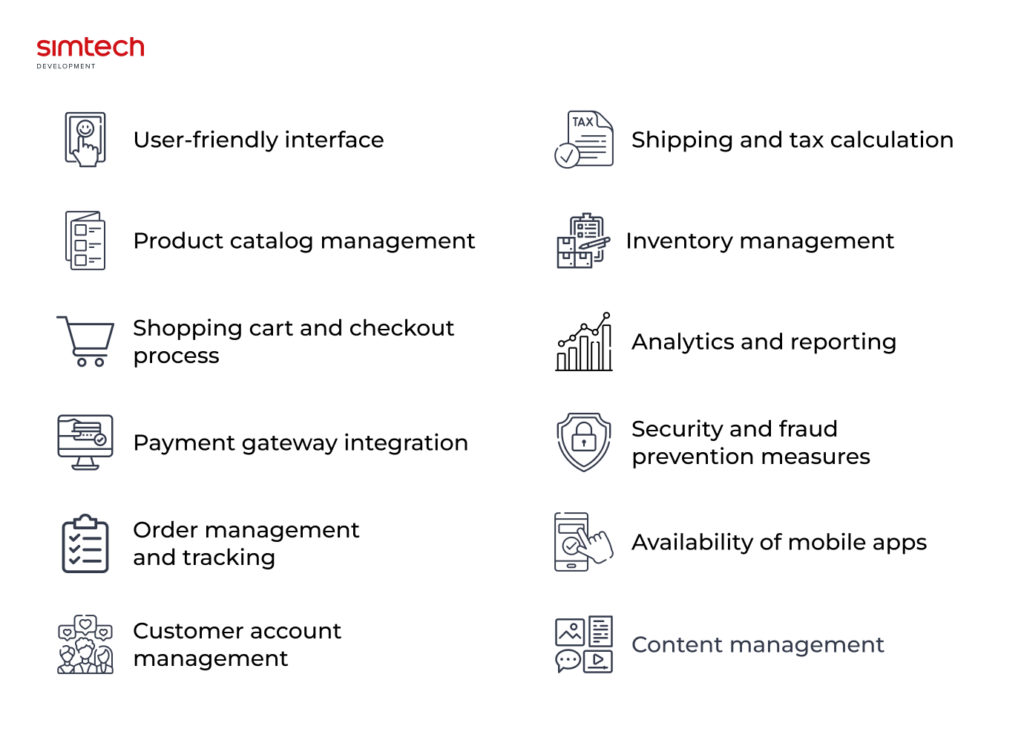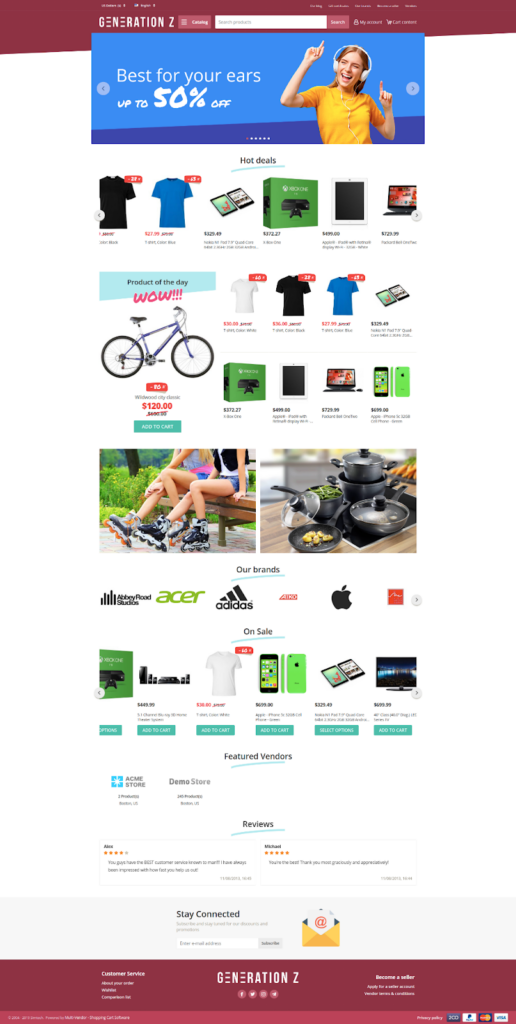No matter what type of products or services you are going to sell online, be prepared to face a large and tough competition, since hundreds of new web stores are emerging on the Internet every single day. Even if you run your business in a very specific market niche, there will always be plenty of your competitors just a click away. That’s why it’s crucial to create a professionally-looking, fully-functional and eye-catchy eCommerce project with the unique storefront look and feel, so that it can really stand out from the crowd and attract your prospective clients.
Importance of Custom eCommerce Solutions
Custom eCommerce platforms for online commerce are essential for businesses that want to stand out in the competitive market. They enable digital entrepreneurs to create an online store that is tailored to their specific needs, rather than using a one-size-fits-all approach. This means that businesses can create a unique experience for the customers, which can help to increase customer loyalty and retention.
Custom solutions also offer eCommerce businesses greater flexibility and control over the online store. They can choose the features and functionality that they need, rather than being limited by the capabilities of pre-built eCommerce platforms. You can build a store that is optimized for the specific products and services, which can help to increase conversion rates and revenue.
Why Customize Your eCommerce Website?
Let’s enumerate reasons to go with customizable eCommerce website:
- Stand out from the competition: By customizing your website, you can make it unique and memorable, helping you stand out from other eCommerce websites. Follow the latest eCommerce trends to meet customers’ expectations.
- Meet customer needs: Custom website development allows you to tailor it to your customer’s needs and increase website conversion rate.
- Improve user experience: A customized website can improve the on-site experience by making it easier to navigate, faster to load, and more visually appealing. Use Web 3.0 features to leverage trust.
- Increase sales: Customized eCommerce solutions can help increase sales by making it easier for customers to find what they’re looking for and making the checkout process smoother and more user-friendly.
Five reasons why you should go with a custom eCommerce solution
Here are five reasons why you should go with an online eCommerce solution:
- Personalized User Experience: A custom eCommerce solution allows you to tailor the user expectations to your specific business needs and target audience, resulting in a more engaging and personalized shopping experience.
- Scalability: A scalable eCommerce solution is designed to scale with your business requirements, allowing you to easily add new features and functionality as your business grows.
- Unique Branding: With a custom eCommerce solution, you have complete control over the design and branding of your online store, ensuring that it stands out from the competition.
- Enhanced Security: A custom eCommerce solution can be built with advanced security features to protect your customer data and prevent fraudulent activity.
- Greater Control: With a custom eCommerce solution, you have greater control over the functionality and features of your online store, allowing you to make changes and updates as needed without relying on third-party plugins or extensions.
Benefits of Custom Solutions
Custom software brings the following benefits to online businesses:
- Improved customer satisfaction: Custom solutions can provide a better customer experience by offering personalized services and solutions that meet the unique needs.
- Increased revenue: Custom solutions scale with the growth of a business, ensuring that they can accommodate increasing demand.
- Increased efficiency: Custom solutions are designed to streamline processes and eliminate inefficiencies, which can save time and increase productivity.
- Improved data management: Custom solutions can help manage data more effectively, reducing the risk of errors and improving data security.
- Competitive advantage: Custom solutions can help businesses differentiate themselves from competitors by offering unique services and solutions.
How to make custom eCommerce solutions

What features should be included in a custom eCommerce solution? Custom solutions are developed to satisfy specific needs. There can be no one-fit-all recommendations here. However, while drafting a list of possible custom e-commerce solutions, consider the following key points:
- User-friendly interface
- Product catalog management
- Shopping cart and checkout process
- Payment gateway integration
- Order management and tracking
- Customer account management
- Shipping and tax calculation
- Inventory management
- Analytics and reporting
- Security and fraud prevention measures
- Availability of mobile apps
- Content management
Bespoke eCommerce solutions may include custom themes, plugins, and modules that are designed to enhance the functionality and user experience of an online store/marketplace. For example, custom themes can be created to match a business’s branding and style, while custom plugins can be developed to add new features or integrations to the store.
Custom themes
Here are some general considerations to check when making a custom theme (or testing the one developed as a customs solution for you):
- Purpose: the purpose of the theme suits the target audience. This influences the design and functionality of the theme.
- Branding: branding elements such as colors, logos, and fonts can be incorporated to maintain consistency with the brand.
- Layout: Consider the layout of the theme, including the placement of navigation menus, widgets, and content areas.
- Responsiveness: Check that the theme is responsive and optimized for all devices, including desktops, tablets, and mobile devices.
- Compatibility: Test the theme for compatibility with different browsers and operating systems.
- Customizability: There are options for users to customize the theme, such as changing colors or fonts.
- Performance: the theme is optimized for performance, the use of scripts is minimum and images are optimized.
- Accessibility: the theme is accessible to all users, including those with disabilities.
These are just a few considerations to keep in mind when creating a custom theme. It’s important to research and stay up-to-date with best practices and trends in web design.
Custom modules and plugins
Check if these considerations are implemented in a custom module or plugin:
- Purpose: the purpose of the module or plugin aligns with the overall goals of the project.
- Compatibility: the plugin is compatible with the system or platform on which it will be used.
- Code structure: a clear and organized code structure makes it easier to understand and maintain the functionality in the future.
- Documentation: clear and concise documentation for the module or plugin makes it easier for others to use and understand.
- Functionality: Test the module or plugin thoroughly to ensure that it functions as intended and does not cause any errors or conflicts with other components.
- Security: the module or plugin is secure and does not introduce any vulnerabilities into the custom eCommerce system.
- Scalability: Consider the potential for future growth and ensure that the module or plugin can handle increased usage and demand.
Read more about custom add-ons development.
Custom integrations
Custom eCommerce integrations refer to the process of integrating an eCommerce platform with other systems, such as a CRM or ERP, to streamline business processes and improve efficiency. This can involve developing custom code to connect the systems and ensure data is properly synced.
Custom eCommerce integrations can include a variety of features and functionalities depending on the specific needs of the business. Some common examples include:
- Payment gateway integration: This involves integrating a payment gateway into the eCommerce platform to enable secure and seamless online transactions.
- Shipping and logistics integration: This involves integrating shipping and logistics providers into the eCommerce platform to enable real-time shipping rates, tracking, and delivery updates.
- Inventory management integration: This involves integrating inventory management software into the eCommerce platform to enable real-time inventory tracking, product availability updates, and automated order fulfillment.
- CRM and marketing automation integration: This involves integrating customer relationship management (CRM) and digital marketing software into the eCommerce platform to enable personalized marketing campaigns, customer segmentation, and targeted promotions.
- Social media integration: This involves integrating social media platforms into the eCommerce platform to enable social selling, social media marketing, and social media analytics.
The process of integration involves connecting two or more systems in a way that they can exchange data and work together seamlessly.
There are several ways to integrate your eCommerce solution with other systems, including:
- API Integration: Many systems offer APIs (Application Programming Interfaces) that allow developers to connect and exchange data between different systems. You can use these APIs to integrate your eCommerce solution with other systems.
- Plug-in Integration: Some systems offer plug-ins or extensions that allow you to integrate them with other systems. You can use these plug-ins to connect your eCommerce solution with other systems.
- Custom Integration: If there is no API or plug-in available for the system you want to integrate with, you can create a custom integration. This involves developing custom code that allows your eCommerce solution to communicate with the other system.
Read more about popular integrations in different countries.
Overall, a custom eCommerce solution provides businesses with a more granulated approach in meeting particular needs as compared to off-the-shelf solutions.
Examples of Custom eCommerce Solutions
Our custom themes and add-ons are designed to enhance the functionality of CS-Cart and provide additional features for online stores. Some examples of Simtech Development custom add-ons include payment and shipping integrations, social media integration, and product management tools.

For example, for Vawoo, we integrated a quite big sea of marketing add-ons to promote the store.

Support with customizing plugins for CS-Cart for the Urbankissed fashion eCommerce store helped the business owner to attract more vendors and grow the business.

Speaking about custom themes, we can proudly share one of the most popular themes developed by our senior developers. It was named Generation Z. The theme is bright, modern and feature rich. It looks equally great on desktop and mobile.
The Future of eCommerce Solutions
The future of custom eCommerce solutions looks promising, with the rise of personalized experiences and the growing demand for online shopping. Custom eCommerce store development services are becoming more advanced, with the integration of artificial intelligence, machine learning, and other technologies that enhance the user experience.
With the rise of mobile usage, it’s no secret that the progressive web app (PWA) has garnered significant attention as the go-to solution for businesses seeking to enhance their online presence.
Blockchain technology revolutionized numerous industries and enterprises. Just look at the rapid growth of OpenSea, SuperRare or NBA Top Shot. If you have ever thought about starting your own NFT store, now is the right time to do it.
Why choose us?
We offer custom eCommerce software development services based on one of the best web shopping carts available today – CS-Cart. With advanced knowledge of CS-Cart platforms, the installation, integration, upgrade and other technical specifications, our engineers are able to create custom online stores of any size – from small and mid-sized online stores to large virtual shopping malls – in full accordance with client needs and expectations. One of our primary business goals is to make your eCommerce experience really effective, successful, lucrative and, what is also important, easy and affordable.
Currently, we have over 5,000 awesome projects in our portfolio. Rest assured, our professionals will deliver you a custom eCommerce platform that will be designed and developed to give you a cutting edge on the Web market. Moreover, we are also ready to take care of your web store in the long run to ensure its ultimate performance and stable growth, while you can fully concentrate on your core business competencies.
Are you on the market today for custom eCommerce solutions and applications with extended functionality and smart, innovative tools? Do you need professional web development assistance to ensure ultimate results, while saving your precious business time? Welcome to Simtech Development – an experienced team of the best CS-Cart development experts who are ready to turn even your most creative ideas into life.
At Simtech Development, we take special pride in being a top CS-Cart authorized custom development company. Actually, our web development experts have been working with CS-Cart since the very start. Contact us today to share your ideas about the future online venture and get a free, no-obligation quote from our experts. No matter how complex and unique your eCommerce project is, you will get it completed in your predefined deadlines.
FAQ
What is a custom eCommerce solution?
A custom eCommerce solution refers to the creation of an online store that is tailored to the specific needs of a business or organization. This includes the design, functionality, and features of the online store, as well as the integration of various third-party services such as payment gateways, shipping providers, and inventory management systems.
A custom eCommerce solution is often necessary for businesses that have unique requirements, such as complex product configurations, multiple pricing tiers, or specialized shipping needs. By creating a custom eCommerce platform, businesses can ensure that the online store meets the exact needs, and provides a seamless shopping experience for customers.
How long does it take to develop a custom eCommerce solution?
The time to develop a custom eCommerce website depends on various factors, such as the complexity of the project, the number of features required, the size of the team, and the technology used. On average, it can take anywhere from 3 to 12 months to develop a custom eCommerce solution.
How much does it cost to develop a customized website?
The cost of developing a custom eCommerce solution can vary greatly depending on the complexity of the project, the features required, and the level of customization needed. Some factors that can affect the cost include:
– Design: The cost will depend on the design complexity, the number of pages, and the overall user experience.
– Custom eCommerce development: The cost will depend on the features required, the number of integrations needed, and the level of customization.
– Testing: The cost will depend on the number of testing phases and the level of testing required.
– Maintenance: The cost will depend on the level of ongoing maintenance and support required.
Overall, the cost of developing a tailored piece of software can range from a few thousand dollars to hundreds of thousands of dollars.
It is recommended to consult with an experienced eCommerce development company or agency to get a more accurate estimate for your specific project needs.
How can I ensure the security of my custom eCommerce website?
– Use a secure hosting service: Ensure that your eCommerce site is hosted on a secure server with up-to-date security protocols and features.
– Implement SSL: Implement SSL (Secure Sockets Layer) to encrypt all data that is transmitted between your eCommerce site and the customer’s browser.
– Use strong and unique passwords: Ensure that all passwords are strong and unique, and change them regularly.
– Use a firewall: Implement a firewall to block unauthorized access to your eCommerce site.
– Keep your software up-to-date: Regularly update your eCommerce software and plugins to ensure that they are free of vulnerabilities.
– Use secure payment gateways: Use secure payment gateways that are PCI-compliant and encrypt all customer payment data.
– Implement two-factor authentication: Implement two-factor authentication to provide an additional layer of security for your eCommerce site.
– Regularly monitor your site: Regularly monitor your eCommerce site for any suspicious activity and take immediate action if any security breaches are detected.
What kind of support and maintenance is required for a custom eCommerce platform?
These platforms require ongoing support and maintenance to ensure that it is functioning correctly and to address any issues that may arise. This includes:
– Regular updates: The software and plugins used in the eCommerce platform need to be updated regularly to ensure that they are secure and functioning correctly.
– Bug fixes: Bugs can arise in any software, and it’s important to have a support team available to address these issues as they arise.
– Server maintenance: The server hosting the eCommerce solution needs to be maintained to ensure that it is secure and reliable.
– Backup and recovery: Regular backups need to be taken of the eCommerce platform to ensure that data is not lost in the event of a server failure or other issue.
– Security: eCommerce solutions need to be secure to ensure that customer data is not compromised. This includes regular security scans and updates to plugins and software.
